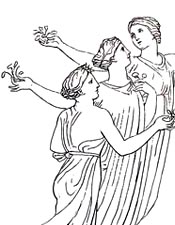Hesiod’s Works and Days
, translated by Kelk, Christopher (contributor-contact-email)
In “Works and Days”, Hesiod advises his brother Perses on the virtues of work and wisdom over material wealth, after Perses squanders his inheritance and subsequently perverts the legal system through bribery in pursuit of his brother’s share. The poem starts with an invocation to the Muses and addresses the role of Zeus in shaping human fate. Hesiod distinguishes between two kinds of strife: one that fosters discord and one that motivates industriousness. Hesiod implores Perses to adopt the latter, resolve their family dispute justly, and cease relying on corrupt judges.
The poem discusses the myth of Pandora, highlighting that before her, mankind lived devoid of suffering. Pandora’s jar unleashed all evils but retained Hope. Subsequently, Hesiod elaborates on the Ages of Man, delineating the decline from a Golden Age of peace to the current Iron Age of toil and moral degradation. He predicts an apocalyptic end for his age. Overall, the work intertwines myth, moral instruction, and social critique, aiming to guide Perses and, by extension, humanity, toward a life of virtuous labour and ethical integrity.

Kelk, Christopher
Support Open-Access:
Your contribution keeps our classical translations available to all. Every dollar helps support classics education and funds the expansion of our catalogue. Value what we do? Donate now.
File Downloads:
© Copyright, All Rights Reserved. This work may be freely reproduced, stored and transmitted, electronically or otherwise, for any non-commercial purpose. Conditions and Exceptions apply.